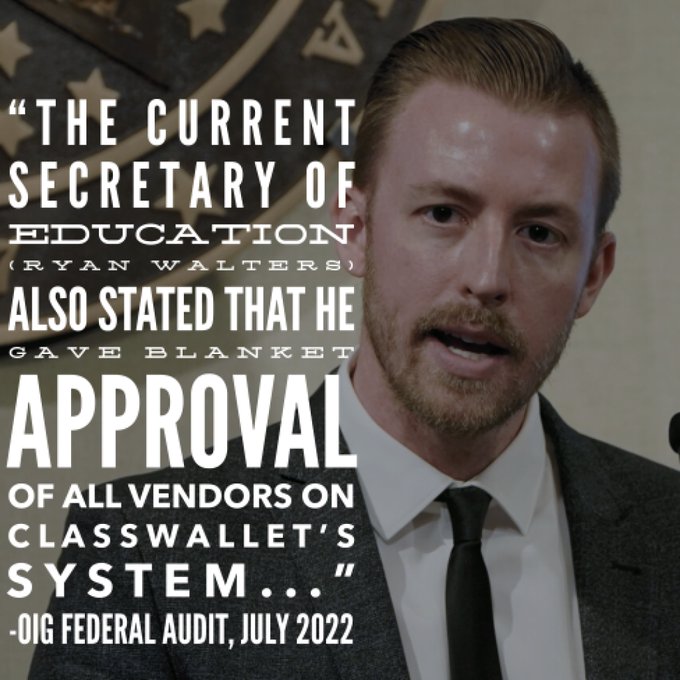Reason #5 to pick Dr. Grace over Mr. Walters: Fiscal management
School superintendents – no matter what size of district – wear many hats. They make countless decisions every year. Every one of those decisions can impact the district’s bottom line.
In a good year, a district will have revenue and expenditures that are pretty closely matched and maintain a healthy fund balance. Superintendents have to ascertain from available information if local and state aid will rise or fall and balance that against enrollment projections.
While the state’s education formula does a fairly good job of equalizing per pupil funding among districts’ general funds, there is no such balance among their general funds and bonding capacity. Additionally, federal funds dispersed under a formula (such as Title I, Title II, IDEA, and Title VI), have highly specific regulations for school district use.
I could have written those paragraphs at any other point in the last 30 years, and they would have summarized the fiscal responsibility of a school superintendent. Most people don’t find it thrilling to discuss, but they would have thoughts if any funds were mismanaged. With all the different Covid relief funds school districts have received, it has never been more important to have systems in place for internal controls. Every penny spent has paper trails. We have to follow rules for bids.
If you want to look at recent audits for Shawnee Public Schools, which has been led by Dr. April Grace since 2016, you will see that those internal controls are in place. If you look at Oklahoma Cost Accounting System (OCAS) reports for recent years, you will also see that Shawnee has maintained a healthy – but not ridiculously high – fund balance.
When I say that experience matters, this is a big part of it. Managing finances for one school district is a big task. Overseeing that effort statewide is huge. Ryan Walters, has proven it’s out of his reach.
As Oklahoma Watch and The Frontier reported back in May:
U.S. Department of Education auditors recommended clawing back more than $650,000 in misspent federal coronavirus relief funds from Gov. Kevin Stitt and reviewing an additional $5.5 million in purchases, according to a federal audit released Tuesday.
The questioned spending came from Stitt’s Bridge the Gap Digital Wallet program, which gave $1,500 grants to low-income families for educational purchases like computers and school supplies during the pandemic.
Auditors pinpointed questionable expenditures like arcade games, Christmas trees, smart watches, sofas, televisions and refrigerators totaling $652,720. The extraneous items made up more than 10% of all purchases. The $5.5 million is the total of purchases the auditors did not analyze and could contain unauthorized items.
Long story short: The Stitt administration allowed misspending of federal Governor’s Emergency Education Relief (GEER) Funds. First, he allowed Ryan Walters – even before he was named Secretary of Education – to arrange a no-bid contract with Florida-based Class Wallet. Walters then proceeded to give blanket approval of all purchases. Basically, rather than placing any kind of internal controls over how the GEER Funds were spent, Stitt, Walters, and Class Wallet took the Outback Steakhouse approach – No Rules, Just Right!
Quoting from a separate Oklahoma Watch/Frontier story:
Other states used federal money to train new teachers or support programs for deaf and blind students. But in Oklahoma, a history teacher with political ambitions helped a Florida tech company win a no-bid state contract to rapidly distribute $8 million to families with little government oversight. Another $10 million went to private school vouchers.
With few guardrails, some families used Oklahoma’s share of federal Governor’s Emergency Education Relief Funds to buy Christmas trees, gaming consoles, electric fireplaces and outdoor grills, an investigation by Oklahoma Watch and The Frontier has found.
Months later the teacher, Ryan Walters, was on a national stage as Stitt’s new Secretary of Education, calling the effort a success.
Suffice it to say that we define success quite differently.
Based on this, can we say for certain that Walters would be bad at managing a multi-billion dollar budget? Sure, it’s only one data point, but on that one point, we know that the federal government is attempting to claw back more than $650,000. Malfeasance has consequences.
I’ll close with a line from the editorial in today’s Stillwater News Press:
Walters had an opportunity to oversee public funds for education and he failed in his duty to manage them.
Dr. April Grace has the experience to manage the finances of Oklahoma’s educational system. Clearly, her opponent does not.
